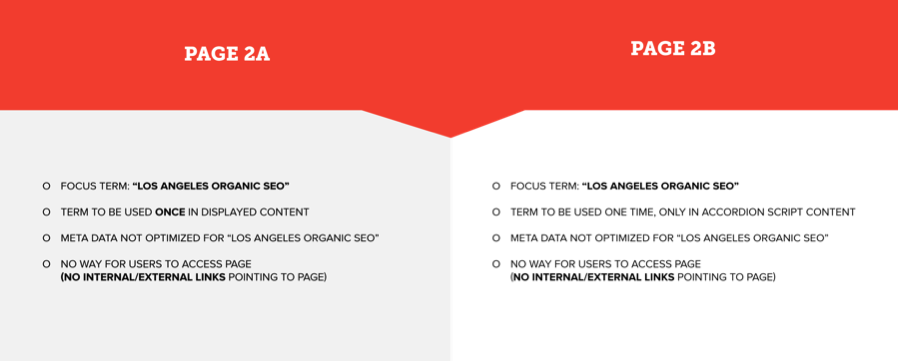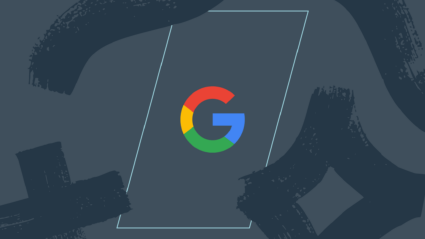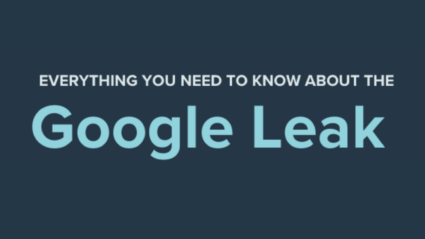Click-to-expand content, accordion scripts, read-more text, or however you prefer to call it has been a topic of debate amongst SEOs for quite some time. Back in November of 2014, Search Engine Roundtable reported that John Mueller of Google threw us a curveball by stating “… if we can recognize that the content is actually hidden, then we’ll just try to discount it in a little bit.” But what does that actually mean? Will the content be indexed but not contribute to ranking, or even indexed at all? We decided to find out for ourselves by conducting a little test.
For this test, we created four pages with unique content that we would try to rank for specific keywords looking to solve the mystery of “what does Google do with hidden content?” Before we jump into the details, I want to clarify that, in our case, “hidden content” means text that’s hidden with CSS or JS but is still ultimately meant to be seen and add value. Typically this text lives under a “read more” button and is revealed to the user when that button is clicked on. Accordion scripts, as we call them, are used to retain a clean web page design while still offering the best content available for the user. We do NOT condone content hidden for use in blackhat SEO to manipulate rankings.
Let’s take a trip back down memory lane and re-visit our grade school friend the scientific method for this study.
- Observation: We have noticed that some pages using accordion scripts have had inconclusive results after implementation. This can mean no increase in rankings, traffic being driven to a page, and other KPIs. These observations in conjunction with John Mueller’s statement have led us to believe that there is a correlation between the two.
- Hypothesis: Does hidden content (in our test, an accordion script) provide some type of benefit for SEO purposes? Since we have seen mixed results in an uncontrolled environment, we believe that an accordion script does have an effect on the page’s ranking ability. We also believe that it has a positive contribution.
- Prediction: Pages utilizing optimized accordion script content will outperform (outrank) pages with less content and no accordion script.
- Experiment: We created two pairs of pages with unique content. Each pair would be focused on ranking organically for a specific keyword, but have different implementations of accordion scripts. Here is an outline of the pages:
Page set 1 is to determine if accordion scripts can help when ranking for a term with a properly optimized page (URL, page title, meta description, etc.).
Page set 2 is to determine if non-primary keywords are indexed and can rank when inside an accordion script.
These pages were fetched and rendered in Google Webmaster Tools at the exact same time. The time elapsed over the course of the experiment was 60 days.
- Results: So what did we find? Are accordion scripts still useful? Well the answer is: it depends. Depending on how you use them and the quality of your content, accordion scripts and other hidden content can still be beneficial.
In Page set 1, we found that Page 1B (additional keyword in accordion script) ranked higher than the page without the additional keyword in an accordion script (achieving rank 9 in Google). This shows that not only are crawlers crawling the content, but when used on a properly optimized page, they can help rank effectively for keywords. We do realize that Page 1B had one more instance of the keyword than Page 1A, and that this means that keyword density may be a major factor, but that was the purpose of this test: If we cannot (for some reason) display all of our content visibly on the page, will accordion scripts still yield a benefit? And the answer is a resounding “yes.”
On the other hand, Page set 2 yielded some different results. Neither page ranked well, but when doing an exact term match in Google for “los angeles organic seo,” the page with the exact match term displayed (Page 2A), while the page with the term in the accordion script (Page 2B) did not. This makes a strong argument that Google will prioritize displayed content over hidden content.
What we can conclude from this are a few things:
- Accordion scripts and hidden content are still being crawled and indexed by Google
- Content in accordion scripts can help boost a page’s authority, as long as the content in the accordion script is supporting the key term the page is optimized for
- Relying on hidden content or “read more” links to try and rank non-primary key terms may not be as valuable as having all of your content visible
Well there you have it. If you have made it this far, I applaud you! You’re a true SEO looking for answers (or the curiosity got the best of you) to the hard-hitting questions.
We realize that this only proves accordion scripts as being a back-up option to add content to a webpage, and not necessarily that content in accordion scripts or hidden content is valued the same as content that is already displayed.
If you have any thoughts on this SEO experiment, let us know in the comments below!








Responses